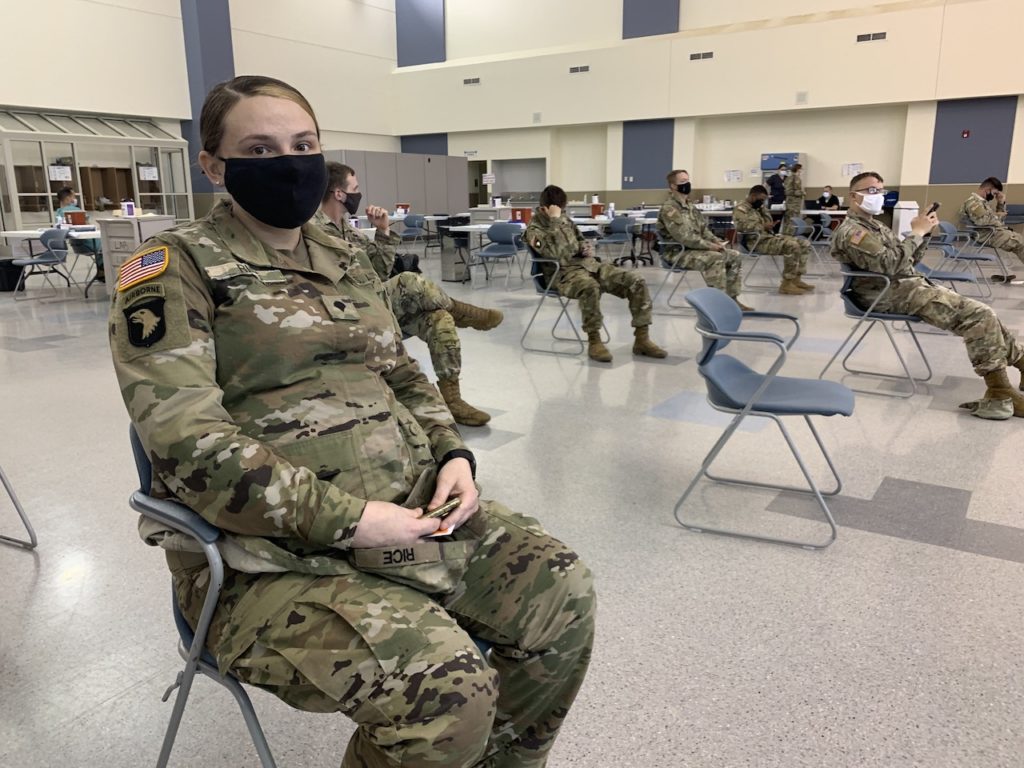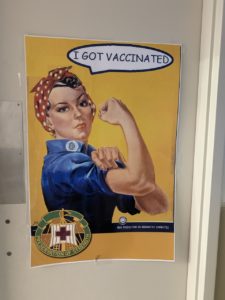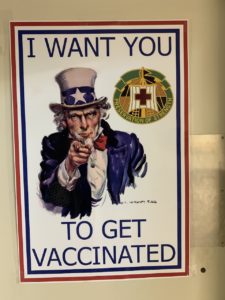
The COVID vaccine campaign has been compared to a wartime effort — but it hits a little different when posters of Rosie the Riveter and Uncle Sam asking people to get their shot are plastered around an Army post like Fort Campbell.
Those who were highly motivated at the post are already fully immunized. The post has vaccinated 23,000 people so far. That’s roughly a third of those who are eligible, counting family members and retirees.
But the rest take varying degrees of convincing, says Col. Patrick Birchfield, commander of Blanchfield Army Community Hospital at Fort Campbell.
“We’re interested in the younger folks who are young and healthy and probably need to be educated on why they need the vaccine,” he says.
 Blake Farmer WPLN News
Blake Farmer WPLN NewsFort Campbell has pinned posters encouraging vaccination around the post, including this one of Rosie the Riveter on a women’s bathroom door.
The difficulty with soldiers is they are — by definition — at far lower risk of complications from COVID-19 than the civilian world. If they had health issues, they wouldn’t have been allowed into the Army.
Yet they live in closer quarters than most people, where COVID could pretty quickly put a platoon out of commission.
“Let’s say I’m going out on a mission, but then I test positive. That would be detrimental to the unit,” says Staff Sgt. Jose Rivera Martinez, a Blackhawk helicopter mechanic in the 101st Airborne Division at Fort Campbell.
Rivera Martinez says he’s had that experience in the past year at his former installation, where the unit had a training mission that had to be reworked or rescheduled because of positive tests and quarantines.
Aside from not wanting to be the weak link, he says as a non-commissioned officer, he’s decided he has to be an example by getting the shot.
“If I get it, I know that I can encourage my soldiers to get it as well,” he says.
A choice, for now
Inside a hangar at the Fort Campbell airfield, Spc. Lorrin Rice unbuttons her fatigues to expose her shoulder. At 35 weeks pregnant, she had questions about the vaccine and her unborn child. She waited until last Friday to get vaccinated.
“Whenever the studies came out that you can pass the antibodies to your baby before it’s even born, that was my selling point,” she says.
 Blake Farmer WPLN News
Blake Farmer WPLN NewsThis poster on a men’s restroom at Fort Campbell encourages soldiers to get vaccinated.
But selling is unfamiliar territory for the Army. The military is more accustomed to giving orders, especially when it comes to vaccinations.
Fort Campbell, which straddles the Tennessee-Kentucky state line, is one of the Army’s larger posts. Health officials are leaning heavily on PSAs and virtual townhall meetings focused on vaccinations.
“The posters are just a fun way to say, ‘hey you know we really want you to do this,'” says Maj. Jade Snader, the lead nurse overseeing vaccinations at Fort Campbell. “We encourage you to do it, and it’s safe, and it’s effective, and it’s just good for the overall unit.”
The Army is not releasing specific vaccination percentages by installation, but it’s clear that many remain unconvinced by Uncle Sam.
There will be no more need for this pitch, though, once federal regulators grant full approval to the vaccines, as expected. It’ll likely just be one more shot every soldier has to line up for.

